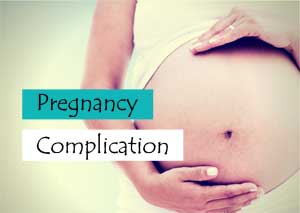- Home
- Editorial
- News
- Practice Guidelines
- Anesthesiology Guidelines
- Cancer Guidelines
- Cardiac Sciences Guidelines
- Critical Care Guidelines
- Dentistry Guidelines
- Dermatology Guidelines
- Diabetes and Endo Guidelines
- Diagnostics Guidelines
- ENT Guidelines
- Featured Practice Guidelines
- Gastroenterology Guidelines
- Geriatrics Guidelines
- Medicine Guidelines
- Nephrology Guidelines
- Neurosciences Guidelines
- Obs and Gynae Guidelines
- Ophthalmology Guidelines
- Orthopaedics Guidelines
- Paediatrics Guidelines
- Psychiatry Guidelines
- Pulmonology Guidelines
- Radiology Guidelines
- Surgery Guidelines
- Urology Guidelines
Women with pregnancy complication may have impaired heart function after delivery

San Francisco : Women who develop preeclampsia earlier in pregnancy are more likely to have thickening in their heart's left ventricle one month after delivery. The changes were more severe among women who developed the condition early before the 34th week of pregnancy, according to research presented at the American Heart Association (AHA) Council on Hypertension, AHA Council on Kidney in Cardiovascular Disease, American Society of Hypertension Joint Scientific Sessions 2017, in San Francisco.
Preeclampsia is a dangerous elevation in blood pressure that occurs in the second half of pregnancy. Women with preeclampsia often have an abnormal amount of protein in the urine. According to the National Institutes of Health, the exact number of women who develop preeclampsia is not known, but it's estimated at 2 percent to 8 percent of all pregnancies globally and about 3.4 percent in the United States.
Early-onset preeclampsia, which occurs before the 34th gestational week, often is a more severe form of the disease, said study author GianLuca Colussi, M.D., assistant professor of medicine, University of Udine, Udine Italy. "Women with early-onset preeclampsia have the greatest risk to develop cardiovascular disease later in life."
Colussi and colleagues studied the heart structure and function of 65 women one month postpartum. The women did not have high blood pressure before becoming pregnant, but developed preeclampsia during pregnancy. Thirty-seven percent of those women had early-onset preeclampsia. For comparison, they also included in the study 16 hypertensive non-pregnant, 6 healthy pregnant and 30 non-pregnant women.
They found:
- Compared to normal pregnant and nonpregnant women, women with preeclampsia had an increased risk of left ventricular hypertrophy. This occurs when the heart's left pumping chamber thickens, which makes it more difficult for the heart to pump efficiently.
- Women with preeclampsia also were more likely to have changes to the left ventricle resulting in diastolic dysfunction, which compromises the heart's ability to relax and fill with blood.
- Women with the early-onset form of preeclampsia developed more severe left ventricular changes, much like those commonly seen in chronic hypertensive patients at elevated risk of cardiovascular disorders.
- Among preeclamptic women, those with the late-onset form had higher blood pressure levels, averaging 136/91 mm Hg, than those with early-onset, at 125/87 mm Hg. A possible explanation, according to Colussi, could be that patients with early-onset preeclampsia recovered earlier than those with late-onset form after delivery.
The findings highlight that pregnant women with preeclampsia and their doctors should be aware of elevated cardiovascular risks that can occur after delivery.
"These women should be screened for major cardiovascular risk factors and prevention strategies should be implemented as soon as possible," Colussi said. "We've shown that women with early onset preeclampsia might be at even greater risk, suggesting preventive interventions, such as using medications that act on left ventricular remodeling."
More research is needed with additional patients to validate these results, as well as help explain why the heart changes are more likely to occur, he said.
In another study on preeclampsia presented at the scientific meeting (Abstract 34), researchers evaluated a telehealth monitoring and treatment intervention, delivered to women with or at risk of developing severe postpartum high blood pressure. Early results suggest the approach is feasable, patients accept it and it's a promising strategy for reducing hospital readmissions and complications from postpartum hypertension.

Disclaimer: This site is primarily intended for healthcare professionals. Any content/information on this website does not replace the advice of medical and/or health professionals and should not be construed as medical/diagnostic advice/endorsement or prescription. Use of this site is subject to our terms of use, privacy policy, advertisement policy. © 2020 Minerva Medical Treatment Pvt Ltd